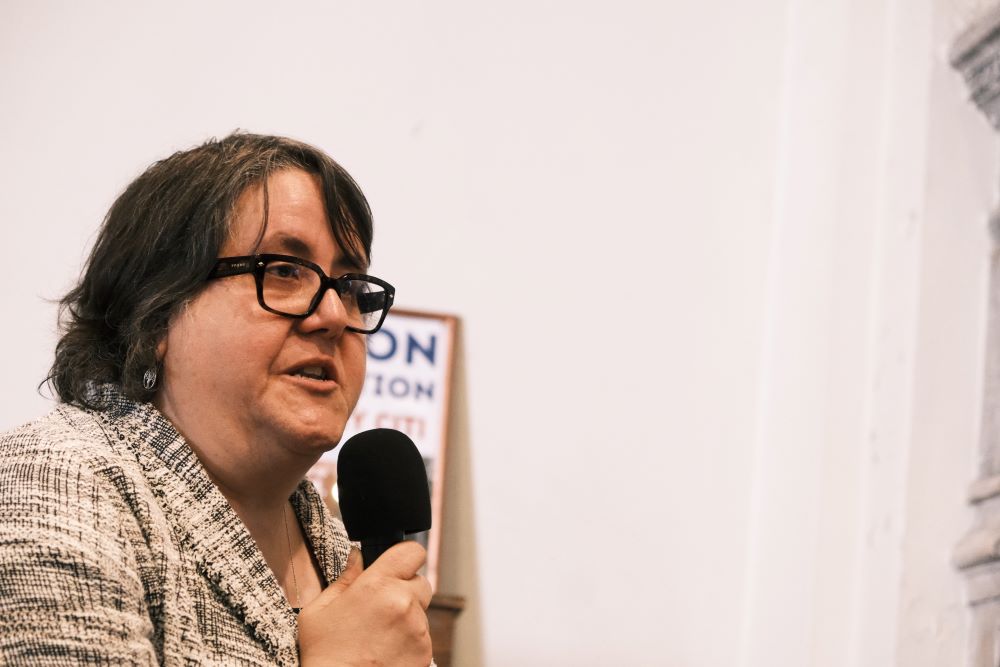
Sr. Susan Francois speaks April 22 in New York at a hearing held by environmental leaders to examine Citigroup's record on environmental racism. (Courtesy of The Sunrise Project)
Catholic sisters in the United States continue to use shares of stock to push publicly-traded companies to address social concerns.
On April 30, a shareholder's resolution led by the Sisters of St. Joseph of Peace won 26% of the vote at Citigroup's annual meeting, enough to be able to file the resolution again next year — which would be the fourth year in a row. The resolution calls for Citigroup, one of the largest investment banks in the world, to examine its efforts to respect the human rights of Indigenous people in the projects it finances and invests in.
"For three years in a row support from investors for our resolution has remained steady at Citi. This is a clear message to the bank that human rights violations are bad for business," said Assistant Congregation Leader Sr. Susan Francois in a statement after the vote. "Today's vote allows us to resubmit the resolution and the Sisters of St. Joseph of Peace will continue to voice concerns over present and future generations impacted by oil, gas and coal projects."
The Sisters of St. Joseph of Peace led a coalition backing the resolution, including the Dominican Sisters of Springfield, Good Shepherd Province Center, Maryknoll Sisters, The Nathan Cummings Foundation, School Sisters of Notre Dame, The Sisters of St. Francis of Philadelphia and Sisters of the Order of St. Benedict.
Francois said in the statement the efforts to protect the human rights of Indigenous people are based on the Gospel and church teaching.
"We are guided by Pope Francis who has set out clearly the Church's role in addressing projects in communities which result in a decline in their quality of life, the clearing of their land and the robbing of joy and hope for the future," she said. "We urge Citi to heed this call too."
Officials said the Citigroup shareholder meeting was dominated by questions about the company's climate, sustainability and human rights record, as well as its investments in liquified natural gas, and oil and gas drilling in the Amazon. The resolution cited Citi's investments in the Dakota Access Pipeline across tribal lands, Enbridge's pipelines in the Great Lakes region and its role as a top financier of oil and gas operations in the Amazon rainforest.
Citigroup management disputed statements in the resolution and urged shareholders to vote against it.
In what activist shareholders called an effort to blunt their resolution, Citigroup released a report just weeks before the annual meeting, saying the company adheres to the principle of "do no harm," especially when it comes to risk to Indigenous people.
"For transactions that may impact these areas, Citi proceeds only after a thorough and judicious assessment of those risks and associated impacts, as well as confirmation that appropriate mitigation measures have been or will be designed," the report said.
The shareholders group called the report "wholly unresponsive," as the resolution does not ask Citi to share its policies, but to gauge whether they are effective.
Advertisement
The April 30 vote followed a week of protests in cities around the world, including Seoul, Sydney, Melbourne, Jakarta, Dallas, Charlotte, San Francisco and New York, where many protesters were arrested after blocking the entrance to Citigroup's headquarters.
At a hearing April 22 in New York, a group of environmental leaders examined Citi's record on environmental racism. Officials from Fossil Free Citi say the bank is the world's second-largest funder of coal, oil and gas projects, and has invested more than $300 billion in fossil fuels since the Paris Agreement was adopted in 2016.
Juan Mancias, tribal chairman of the Carrizo Comecrudo Tribe of Texas, called on Citi to respect Indigenous people and their lands.
"Citi has provided Enbridge with over $5 billion in financing enabling the Rio Bravo pipeline which Enbridge is trying to build on Carrizo Comecrudo land. Citi clients like Enbridge will destroy acres of wetlands and the habitats of threatened and endangered plant and animal species. These projects affect us as a tribe," Mancias said in a statement. "We urge Citi to stop investing in companies that steal Indigenous land and exploit our environment."








